Haohao Zhu
Commonality and Individuality! Integrating Humor Commonality with Speaker Individuality for Humor Recognition
Feb 07, 2025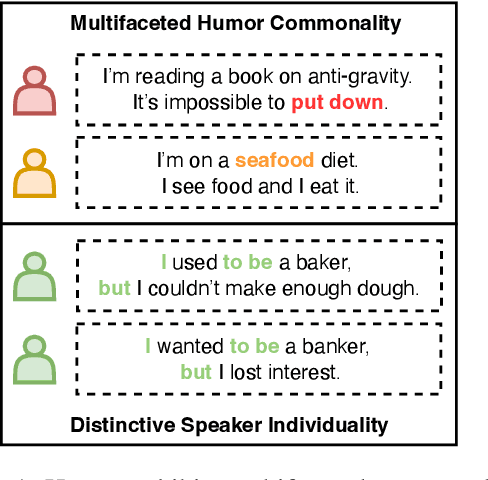

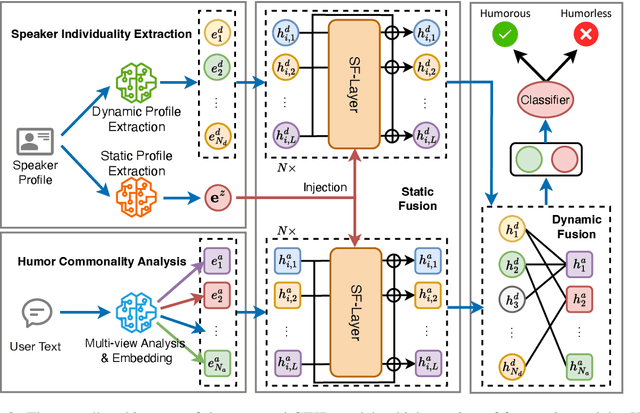

Abstract:Humor recognition aims to identify whether a specific speaker's text is humorous. Current methods for humor recognition mainly suffer from two limitations: (1) they solely focus on one aspect of humor commonalities, ignoring the multifaceted nature of humor; and (2) they typically overlook the critical role of speaker individuality, which is essential for a comprehensive understanding of humor expressions. To bridge these gaps, we introduce the Commonality and Individuality Incorporated Network for Humor Recognition (CIHR), a novel model designed to enhance humor recognition by integrating multifaceted humor commonalities with the distinctive individuality of speakers. The CIHR features a Humor Commonality Analysis module that explores various perspectives of multifaceted humor commonality within user texts, and a Speaker Individuality Extraction module that captures both static and dynamic aspects of a speaker's profile to accurately model their distinctive individuality. Additionally, Static and Dynamic Fusion modules are introduced to effectively incorporate the humor commonality with speaker's individuality in the humor recognition process. Extensive experiments demonstrate the effectiveness of CIHR, underscoring the importance of concurrently addressing both multifaceted humor commonality and distinctive speaker individuality in humor recognition.
STATE ToxiCN: A Benchmark for Span-level Target-Aware Toxicity Extraction in Chinese Hate Speech Detection
Jan 26, 2025
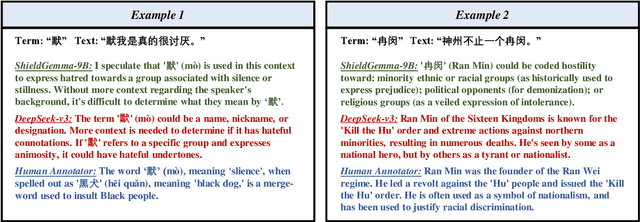
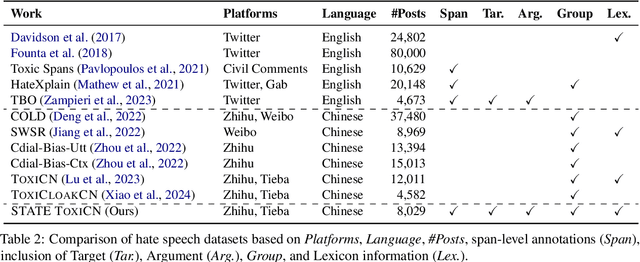
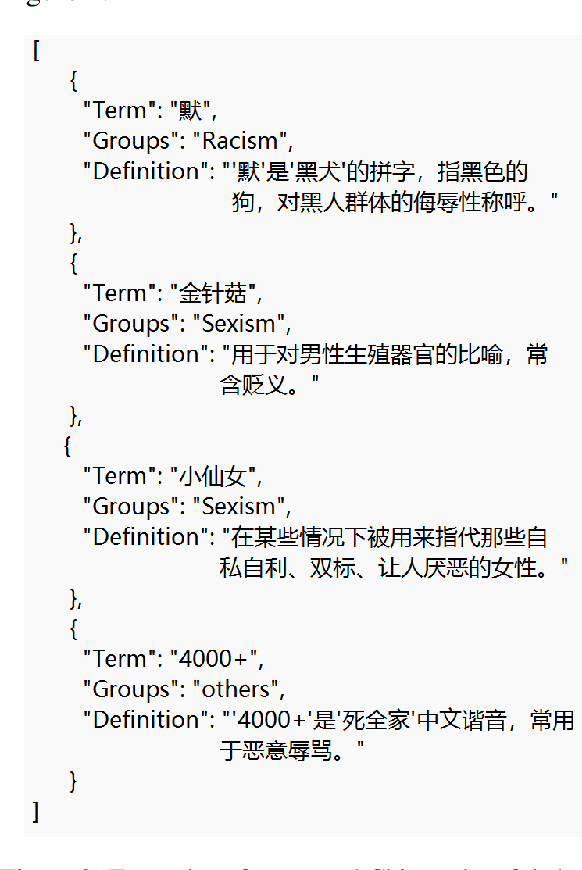
Abstract:The proliferation of hate speech has caused significant harm to society. The intensity and directionality of hate are closely tied to the target and argument it is associated with. However, research on hate speech detection in Chinese has lagged behind, and existing datasets lack span-level fine-grained annotations. Furthermore, the lack of research on Chinese hateful slang poses a significant challenge. In this paper, we provide a solution for fine-grained detection of Chinese hate speech. First, we construct a dataset containing Target-Argument-Hateful-Group quadruples (STATE ToxiCN), which is the first span-level Chinese hate speech dataset. Secondly, we evaluate the span-level hate speech detection performance of existing models using STATE ToxiCN. Finally, we conduct the first study on Chinese hateful slang and evaluate the ability of LLMs to detect such expressions. Our work contributes valuable resources and insights to advance span-level hate speech detection in Chinese
Towards Comprehensive Detection of Chinese Harmful Memes
Oct 03, 2024



Abstract:This paper has been accepted in the NeurIPS 2024 D & B Track. Harmful memes have proliferated on the Chinese Internet, while research on detecting Chinese harmful memes significantly lags behind due to the absence of reliable datasets and effective detectors. To this end, we focus on the comprehensive detection of Chinese harmful memes. We construct ToxiCN MM, the first Chinese harmful meme dataset, which consists of 12,000 samples with fine-grained annotations for various meme types. Additionally, we propose a baseline detector, Multimodal Knowledge Enhancement (MKE), incorporating contextual information of meme content generated by the LLM to enhance the understanding of Chinese memes. During the evaluation phase, we conduct extensive quantitative experiments and qualitative analyses on multiple baselines, including LLMs and our MKE. The experimental results indicate that detecting Chinese harmful memes is challenging for existing models while demonstrating the effectiveness of MKE. The resources for this paper are available at https://github.com/DUT-lujunyu/ToxiCN_MM.
Integrating Multi-view Analysis: Multi-view Mixture-of-Expert for Textual Personality Detection
Aug 16, 2024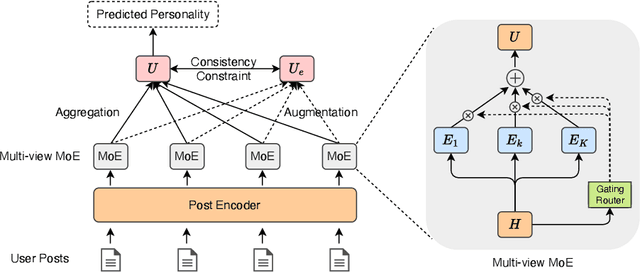
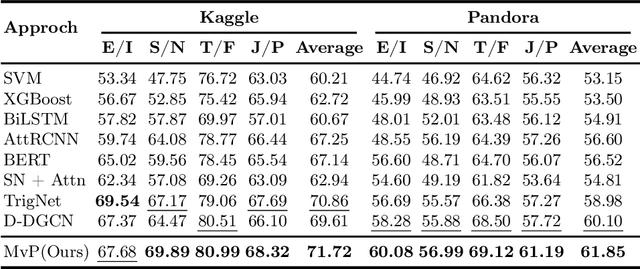

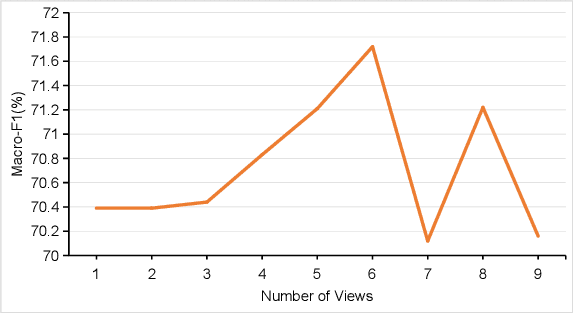
Abstract:Textual personality detection aims to identify personality traits by analyzing user-generated content. To achieve this effectively, it is essential to thoroughly examine user-generated content from various perspectives. However, previous studies have struggled with automatically extracting and effectively integrating information from multiple perspectives, thereby limiting their performance on personality detection. To address these challenges, we propose the Multi-view Mixture-of-Experts Model for Textual Personality Detection (MvP). MvP introduces a Multi-view Mixture-of-Experts (MoE) network to automatically analyze user posts from various perspectives. Additionally, it employs User Consistency Regularization to mitigate conflicts among different perspectives and learn a multi-view generic user representation. The model's training is optimized via a multi-task joint learning strategy that balances supervised personality detection with self-supervised user consistency constraints. Experimental results on two widely-used personality detection datasets demonstrate the effectiveness of the MvP model and the benefits of automatically analyzing user posts from diverse perspectives for textual personality detection.
Enhancing Textual Personality Detection toward Social Media: Integrating Long-term and Short-term Perspectives
Apr 23, 2024
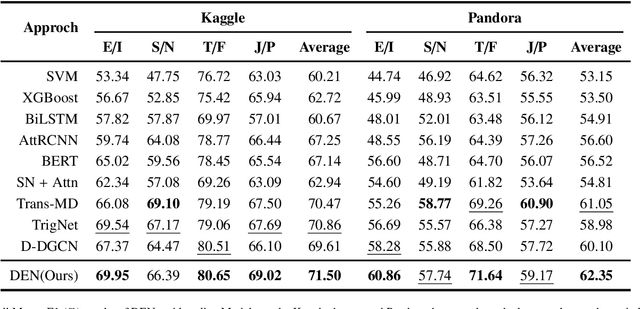
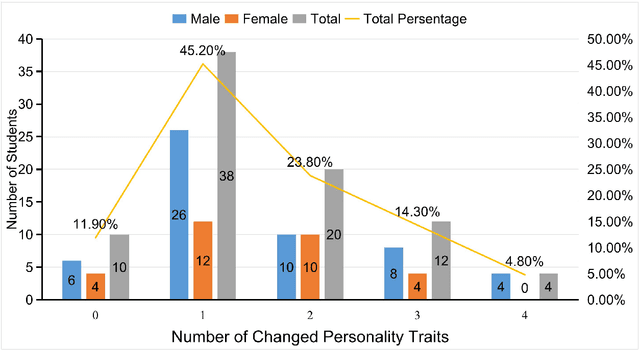
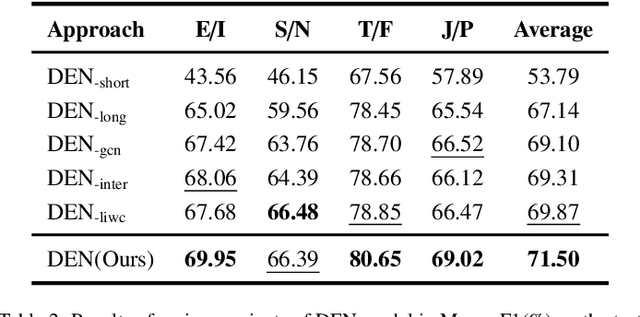
Abstract:Textual personality detection aims to identify personality characteristics by analyzing user-generated content toward social media platforms. Numerous psychological literature highlighted that personality encompasses both long-term stable traits and short-term dynamic states. However, existing studies often concentrate only on either long-term or short-term personality representations, without effectively combining both aspects. This limitation hinders a comprehensive understanding of individuals' personalities, as both stable traits and dynamic states are vital. To bridge this gap, we propose a Dual Enhanced Network(DEN) to jointly model users' long-term and short-term personality for textual personality detection. In DEN, a Long-term Personality Encoding is devised to effectively model long-term stable personality traits. Short-term Personality Encoding is presented to capture short-term dynamic personality states. The Bi-directional Interaction component facilitates the integration of both personality aspects, allowing for a comprehensive representation of the user's personality. Experimental results on two personality detection datasets demonstrate the effectiveness of the DEN model and the benefits of considering both the dynamic and stable nature of personality characteristics for textual personality detection.
 Add to Chrome
Add to Chrome Add to Firefox
Add to Firefox Add to Edge
Add to Edge